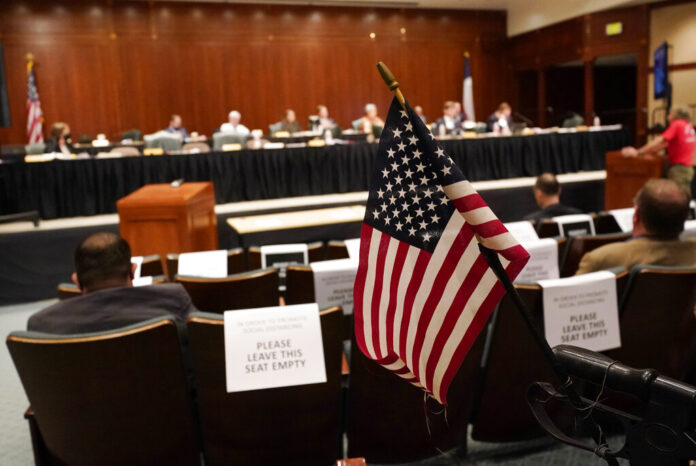By ACACIA CORONADO Report for America/Associated Press
AUSTIN, Texas (AP) — Texas Republicans brought back their voting bill Monday with no changes as some Democrats returned to the Capitol for the first time since ending their holdout, making it clear that the bill is on track to become law after their 38-day walkout.
Dozens of people showed up to testify before lawmakers to seize their last chance for public input on the the bill that will tighten voting rules in ways the GOP says will ensure election integrity and that Democrats say amounts to voter suppression for disabled people and minorities.
Senate Bill 1 would make mail voting a stricter process, increase liberties for poll watchers, and prohibit 24-hour and drive-thru voting, two ways the Harris County — which includes Houston and where 44% of the nearly 5 million residents are Latino and 20% are Black — expanded options for voters and also offered protections against the coronavirus.
Candis Houston, who lives in Houston, said she arrived in Austin on Sunday night so she could show up early Monday to testify. She joined about 70 other people who arrived at the Capitol as the sun was rising.
Houston is against the voting overhaul and wanted to share her experience of using a drive-thru polling location with her daughters, including one who was positive for COVID-19, during the November election. Houston said she and her daughters’ identities were thoroughly verified before they cast ballots, that they were not allowed to have cell phones out and that it was more convenient than having to go into a building to vote.
“I had ancestors that died and marched for the privilege for us to vote, and anytime I can participate, I am going to be there,” said Houston, who is Black. “We should be encouraging people to vote and not limiting them by limiting where and when they can vote.”
But Steve Lawrence, of the Houston suburb of The Woodlands, showed up to press lawmakers to pass the bill. Lawrence said he was precinct chairman, a partisan position that registers voters and encourages them to show up and cast a ballot. But he said he didn’t trust the way the 2020 election was conducted and wanted to ask the Legislature to make procedural changes on how mail ballot corrections are managed, as well as language on forensic backups to results and system maintenance.
“We are not happy with the election, and the way that there seems to be such a fight to stop any examination of the systems,” Lawrence said. “I think they wouldn’t be fighting so hard if there wasn’t something there.”
A House committee amended Senate Bill 1 on Monday to match language in the House version of the bill. The panel was expected pass the legislation that will next head to a vote of the full House, leaving it just steps from the desk of Republican Gov. Greg Abbott, who is expected to sign it into law.
Texas is the last of the big GOP-run states that has yet to pass more restrictive voting laws, largely because more than 50 Democrats in the state House of Representatives jetted off to Washington D.C. in July to block the proposals. The maneuver kept the House from having enough members for a quorum that would allow it to conduct business. It was an escalation of a similar tactic Democrats used by walking out during the waning hours of the regular legislation session in May.
Former President Donald Trump’s false claims that the 2020 election was stolen have stoked discontent among many Americans and driven the Republican party to impose the changes. But GOP lawmakers don’t frequently invoke Trump’s name.
“The legislative intent of the bill is the application of this code and the conduct of elections be uniform and consistent throughout the state to reduce the likelihood of fraud in the conduct of elections, protect the secrecy of the ballot, promote voter access and ensure all legally cast ballots are counted, so Texans remain confident in a reliable elections system” said Republican Rep. Andrew Murr, the author of the bill. He told the House committee Monday that the language was inspired by bipartisan input.
Ending the walkout showed fissures among Texas Democrats, with some who wanted to keep holding out publicly criticizing their fellow representatives. But even Texas residents and activists who showed up to testify Monday acknowledged the end of what appears to be a losing battle is likely drawing near.
Far fewer people waited in line to speak compared to earlier in the year, when hundreds lined up. Texas’ current surge in COVID-19 cases and hospitalizations because of the super-contagious delta variant could have been one reason more avoided the crowded Capitol.
But Amber Mills, a volunteer with the nonpartisan organization MOVE Texas, which advocates for underrepresented communities, said the low turnout Monday didn’t mean Texans support the voting legislation. And in her view, the fight against the bill already has had wins.
“Even if lose on this bill today, or tomorrow, or whenever it happens, we are in a better position than we were last session and we know we will keep moving forward that way,” Mills said.




